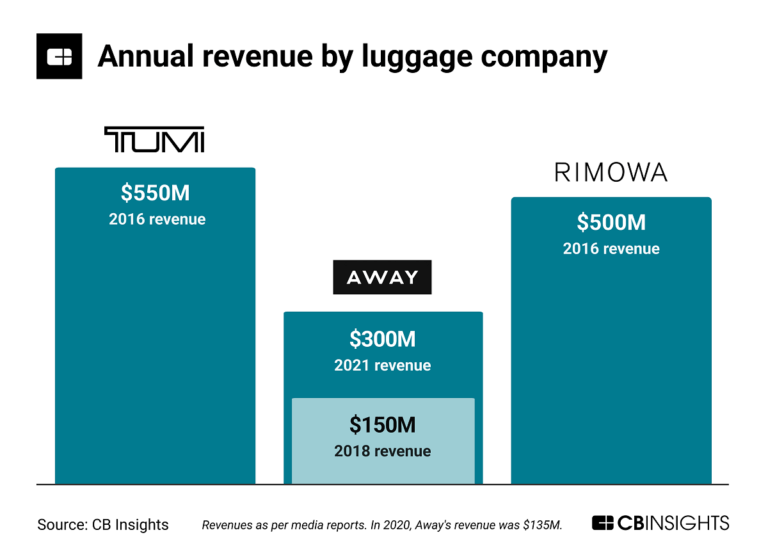
Away
Founded Year
2015Stage
Convertible Note | AliveTotal Raised
$181.1MMosaic Score The Mosaic Score is an algorithm that measures the overall financial health and market potential of private companies.
-34 points in the past 30 days
About Away
Away specializes in luggage and travel accessories within the travel industry. Its main offerings include a range of suitcases, bags, and accessories focusing on durability and functionality. The company caters to the travel industry and offers products suitable for frequent travelers. It was founded in 2015 and is based in New York, New York.
Loading...
Loading...
Research containing Away
Get data-driven expert analysis from the CB Insights Intelligence Unit.
CB Insights Intelligence Analysts have mentioned Away in 1 CB Insights research brief, most recently on Feb 21, 2023.
Expert Collections containing Away
Expert Collections are analyst-curated lists that highlight the companies you need to know in the most important technology spaces.
Away is included in 4 Expert Collections, including Direct-To-Consumer Brands (Non-Food).
Direct-To-Consumer Brands (Non-Food)
1,192 items
Startups selling their own branded products directly to consumers through owned e-commerce channels, rather than relying on department stores or big online marketplaces.
E-Commerce
11,424 items
Companies that sell goods online (B2C), or enable the selling of goods online via tech solutions (B2B).
Unicorns- Billion Dollar Startups
1,297 items
Travel Technology (Travel Tech)
2,715 items
The travel tech collection includes companies offering tech-enabled services and products for tourists and travel players (hotels, airlines, airports, cruises, etc.). It excludes financial services and micro-mobility solutions.
Latest Away News
Oct 16, 2025
By a lot of measures, 2025 is the year of traveling light. From wheeled market totes to packable duffels that disappear into a jacket pocket, a wave of “non-luggage” bags is reshaping how people move through airports, trains, and city sidewalks. A standout of the genre is the Hulken, a fold-flat rolling tote that looks more farmers' market than frequent flyer (until you notice the swivel wheels and upright, open-top frame that swallows coats, snacks, and duty-free with grocery-cart ease). I've even spotted these mom-approved totes at kids' dance competitions. According to online reviews, Urban travelers also praise it for hotel-to-venue schlep days and family trips that spawn overflow items after boarding. The bag folds flat, is water-resistant, and is built to stay open as you pack. Think small but meaningful details when you're juggling kids or coffee. The “personal-item powerhouse” is another fast-rising category. Béis popularized the weekend-tote hybrid with a zip-off lower compartment for shoes and toiletries—features designed around security lines and tiny hotel bathrooms. Calpak's puffy Luka Duffel, sized to tuck under most airline seats, adds a dedicated shoe bay and a grid of pockets, while Away's Everywhere Bag focuses on a wide, wraparound zipper and a 16-inch laptop sleeve. Together, these designs reflect the same pressure point: a desire to max out the personal-item allowance as airlines scrutinize overhead bin space. Organization-first “work-to-wheel” totes meant to function as office bags Monday and travel bags Friday are also thriving. Dagne Dover's neoprene Landon Carryall is a case study in compartmentalization: removable pouches, a key leash, and a shoe bag in a squishy shell that slides beneath a seat without hard-siding your knees. Brands are effectively selling calm—everything visible on the first unzip. Classic names are adapting, too. Longchamp's Le Pliage—an origami-inspired nylon tote first released in the '90s—has reemerged with Gen Z thanks to its foldability and price point, while luxury luggage label Rimowa is moving beyond polycarbonate suitcases into Italian-made leather handbags that clip to a roller but double as daily carry. Both nod to a blurring line between fashion bag and travel tool. Mass brands are following the same current. Lululemon's belt and crossbody bags (tiny, hands-free carriers for passports and phones) keep selling out, while seasonal collaborations push coordinated sets of totes, duffels, and organizers just in time for holiday travel. The message is coherent: most trips aren't transoceanic; most travelers want modular kits they'll also use at home. Why the shift? Partly policy, maybe. As airlines tighten enforcement of carry-on dimensions and encourage smaller under-seat items, travelers are optimizing the one piece they can always bring with them. And partly lifestyle: hybrid work has blurred business and leisure packing lists, making a bag that goes from gym to gate more useful than a full suitcase for two-night trips.
Away Frequently Asked Questions (FAQ)
When was Away founded?
Away was founded in 2015.
Where is Away's headquarters?
Away's headquarters is located at 82 Mercer Street, New York.
What is Away's latest funding round?
Away's latest funding round is Convertible Note.
How much did Away raise?
Away raised a total of $181.1M.
Who are the investors of Away?
Investors of Away include Wellington Management, Scottish Mortgage Investment Trust, Global Founders Capital, Lone Pine Capital, Comcast Ventures and 11 more.
Who are Away's competitors?
Competitors of Away include Paravel, July, Solgaard, Arlo Skye, Travelbags and 7 more.
Loading...
Compare Away to Competitors

July specializes in luggage, offering a range of travel bags and suitcases. The company provides products designed to meet travel needs, including personalization options and a warranty on manufacturing faults. July's direct-to-consumer sales model allows them to offer features at competitive prices. It was founded in 2019 and is based in Melbourne, Victoria.
Eagle Creek specializes in travel gear and accessories, operating within the luggage and travel accessories industry. The company offers a range of products including luggage, packing organizers, duffels, and travel packs designed for durability and functionality. Eagle Creek's products are primarily targeted at travelers seeking reliable gear for various types of journeys. It was founded in 1975 and is based in Steamboat Springs, Colorado.
BÉIS is a brand that offers a range of products including luggage, bags, and travel accessories. The products are designed to serve functional purposes and appeal to those interested in both organization and design. It was founded in 2018 and is based in El Segundo, California.

Horizn Studios offers luggage and travel accessories. It offers products including travel luggage with integrated technology, backpacks, and travel accessories, designed with a focus on sustainability and quality. It caters to the luxury travel market with an emphasis on environmentally friendly practices. It was founded in 2015 and is based in Berlin, Germany.

Biaggi produces luggage and travel bags that are foldable and feature 4-wheel spinner technology, adjustable handles, and multiple pockets for personal items. The products are designed for travelers. It is based in United States.

Cabaia is a French company that creates backpacks, luggage, and accessories within the fashion industry. The company offers products such as backpacks with a lifetime warranty, interchangeable pom-pom beanies, and inseparable socks designed to stay together during laundry. Cabaia primarily sells to consumers. It was founded in 2015 and is based in Paris, France.
Loading...

